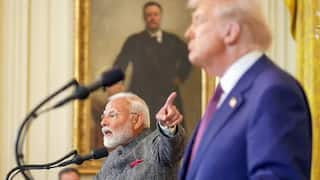What Is 'Bisht'? Traditional Arabian Robe Lionel Messi Was Given To Wear As He Lifted World Cup Trophy
The internet was divided over Lionel Messi wearing the traditional 'Bisht' as many opined that the traditional clothing had ruined Messi's photo while receiving the trophy and with rest of the team.

Argentina captain Lionel Messi was draped in a traditional Arab outfit, a black robe, when he received the prestigious FIFA World Cup 2022 trophy during the presentation ceremony after ARG vs FRA match at Qatar's Lusail Stadium, Sunday. Before Messi received the trophy, Qatari emir Sheikh Tamim bin Hamad bin Khalifa Al Thani covered his shoulders with the shroud. The internet was divided over this as many opined that the traditional clothing had ruined Messi's photo while receiving the trophy and with rest of the team. Others called the gesture a 'great honour' for the Argentine legend. After getting clicked with the traditional Bisht, Messi took it off to continue celebrations with his teammates in their national colours of blue and white.
Lionel Messi honoured with a black cloak called Bisht. In Arab tradition it is worn on special or prestigious occasions.
— Uzair Rizvi (@RizviUzair) December 18, 2022
Qatar simply acknowledged Messi’s win in their own tradition. #FIFAWorldCup #Argentina
pic.twitter.com/H5kZwfWLOP
What Is 'Bisht', The Black Robe, Anyway?
The black robe donned by Messi is a traditional Arab clothing known as a 'bisht'. The black transparent body with golden borders apparently cost QAR 8,000 ($2,000 approximately), according to reports. Messi lifted the FIFA World Cup 2022 trophy while wearing it. The traditional cloak, or bisht, is worn by people living in Arab countries on special occasions such as weddings or religious ceremonies.
Hassan Al Thawadi, secretary general of Qatar's tournament organising committee, was quoted as saying by BBC Sport that the Bisht “was a celebration of Messi”. “It is a dress for an official occasion and worn for celebrations. The World Cup had the opportunity to showcase to the world our Arab and Muslim culture. This was not about Qatar, it was a regional celebration,” he said.
“People from different walks of life were able to come, experience what was happening here and get to understand that we may not see eye to eye on everything, but we can still celebrate together,” Hassan Al Thawadi added.
Related Video
Breaking: PM Narendra Modi to Virtually Inaugurate 72nd National Volleyball Tournament in Kashi



































